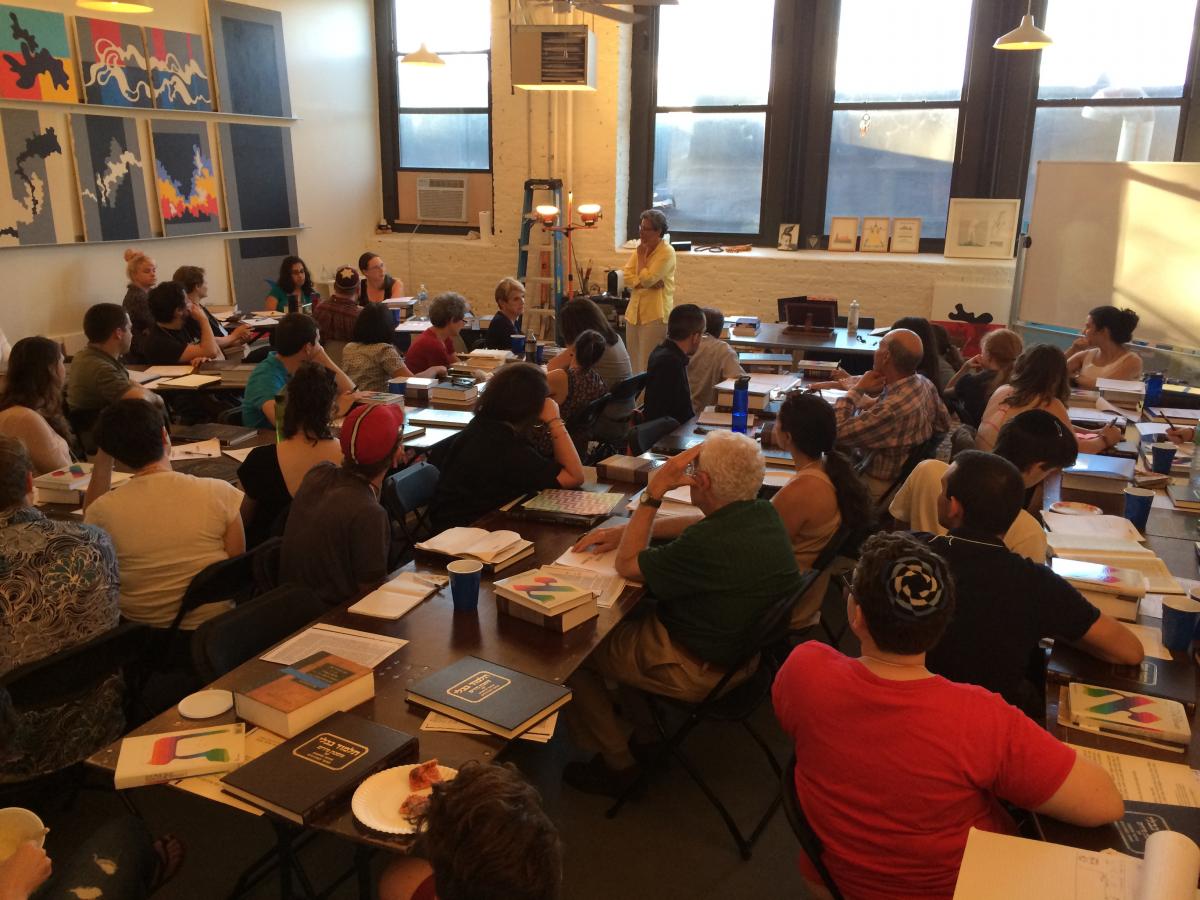
It was June 26, 2003 – the day the Supreme Court overturned the sodomy laws – that Benay (JTS, ’97) first thought about founding SVARA, now a unique, thriving, traditionally radical yeshiva in Chicago dedicated to the serious study of Talmud. That decision was 13 years ago and the world has changed a lot since then. “Now, all young people are queer-headed, in the broader sense of having an ‘edgy, outsider perspective regardless of their sexual orientation,” and SVARA has gained a reputation for being “the place to learn in Chicago,” and to find community—for everyone, gay or straight. The population studying at SVARA is young – 75% of its students are between 25 and 35—and while approximately 50% are part of the LGBT community, all of the students are “Queer” in that broader sense of having an “outsider” perspective.
SVARA’s uniqueness lies in making accessible to everyone the experience of learning Talmud in the original Hebrew/Aramaic (never in translation), straight from the Vilna Shas. Sixty-some learners come weekly to SVARA’s mixed-level evening batei midrash. Some have just learned their alef-bet, while some are rabbis or teachers of Talmud themselves. “Everyone learns in chevruta. The beginners work out a few lines of text each night, while the more experienced students also dive into Rashi, the codes, and commentaries on those same lines, and during shiur everyone joins in the same discussion.” After shiur, the students go back into chevruta to review and memorize every text they learn.
The traditional element of the yeshiva is implicit in the name SVARA, “a 2,000-year-old Jewish concept invented by the Rabbis of the Talmud to refer to one’s moral intuition informed by Jewish learning.” And it’s “radical” in that it foregrounds the willingness of the Rabbis to deviate radically from the Torah based on what their svara tells them. The yeshiva’s primary interest is not so much the subject matter of the sugya as it is the Talmud’s agenda of “demonstrating the methodology of drawing on one’s radical empathy to deviate, when necessary, from the Torah to make the tradition better. It’s a history and handbook of Jewish disruptive innovation.” SVARA’s method of study is “thick, demanding, and extremely rigorous” and is designed to equip every learner to be a “player” in the Jewish tradition. Benay envisions a world in which there will be “a bet midrash on every corner,” and lots of Jews will be doing their Judaism and finding their community there, spreading a spiritual practice that SVARA students say keeps them “in balance” all week.
Finding Community in the Bet Midrash
SVARA offers multiple Talmud study programs. Last summer, for instance, there was a five-day retreat in Wisconsin – five days of Talmud learning, with six to ten hours in the bet midrash every day —attended by 55 students from 19 states. There are also six-week batei midrash terms in the evening year-round and numerous “One Night Stands” which provide a taste of SVARA-style learning for those wanting to try it out. Because learning “always begins with first learning why we’re learning at all,” there is also the mandatory “CRASH talk” at which Benay lays out some Talmud basics, her philosophy of the Talmud, why its study has been so important for Judaism and “the formation of the Jewish personality,” and also provides a crash course in halachic jurisprudence (an 18-minute version of which she delivered as an ELI Talk, http://elitalks.org/unrecognizable-jewish-future-queer-talmudic-take). Teen SVARA, open to all high school students, meets for two fifteen-week semesters over the course of the academic year. SVARA also travels around the country, holding pop-up batei midrash in partnership with congregations and communities looking for a new kind of Torah study. SVARA recently expanded, adding a full-time program that the JTS Rabbinical School has deemed to be appropriate preparation for future JTS rabbinical students, in lieu of the former mechinah program.
Benay sees a convergence of issues behind the success of SVARA. Jews are looking for alternative ways of doing Jewish and finding community, hungry for a challenging, intellectual experience that is also intimate. She credits her partnership with Lizzi Heydemann’s (Ziegler, 2010) Mishkan Chicago, an independent spiritual community, for stimulating SVARA’s most recent growth spurt. She sees herself as engaged in creating “the gedolim of the next generation” - the Talmud teachers who will emerge from her study hall, “excited, proud, and inspired” by a tradition that is “smarter and more sophisticated than they ever imagined,” and equipped with the pedagogy that is the “secret sauce” of SVARA’s success. Recognition has come from students within SVARA and outside, including from Slingshot, which has selected it “as among the most exciting and innovative organizations in the Midwest,” and whose evaluators concluded: “SVARA is pioneering a new frontier in Jewish education for teens and adults – it is wonderful to see a queer-dominant framework that welcomes and engages straight people.” And just recently, the Covenant Foundation announce that Benay is the recipient of the prestigious 2016 Covenant Award for excellence in Jewish education.
For more about SVARA see http://www.svara.org.
*SVARA understands itself as queer in its effort to move towards a more just, inclusive and accessible world in which all people are able to live out their most fully human lives. Being queer is about thinking, living, learning, and studying in radical ways—not only to challenge society’s norms related to gender and sexuality, but to speak the silences and render the invisible seen. Like Jewish insight, queer insight is drawn from the experience of being on the fringe—whether that has to do with sexual orientation, gender identity, or any profound experience of otherness which gives one valuable insight into human nature and a critique on the mainstream.

Add new comment